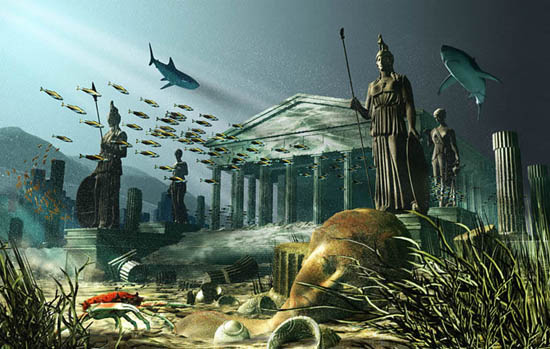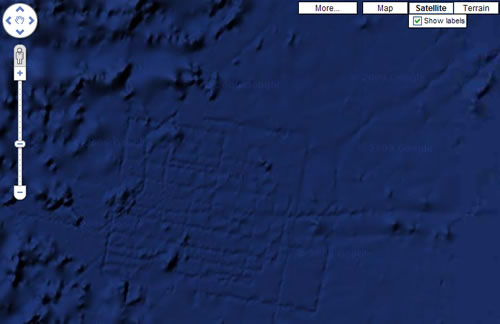'Find the legendary city of Atlantis'
A group of US-led researchers may eventually have identified the lost city of Atlantis - the legendary city believed to be buried by a tsunami thousands of years ago in southern Thailand. Home

Photo simulated city lost Atlantis.
'This is the power of tsunamis, ' said lead researcher Richard Freund.
' It's hard to imagine that tsunamis can land 100km deep inland, but that's what we're talking about, ' said Freund, a professor at the University of Hartford, Connecticut, head of the research team. Internationally in search of the true location of Atlantis, said.
In order to decipher the mystery over the years, the team used satellite imagery of a city thought to be submerged to find a location just north of Cadiz, Spain. In this place, which was buried in the vast swamps of Dona Ana Park, they believed that they had found the ancient city known as Atlantis.
The group of archaeologists and geologists combined the use of ground radar, digital maps and underwater technology to study the area.

Found the lost city of Atlantis thanks to the Google Ocean search engine
Here, the team discovered a series of strange " memorial cities " built by refugees on the image of Atlantis after the city was destroyed by a tsunami. That helped researchers gain more evidence and trust.
Mr. Freund said the Atlantis were fortunate to have survived the tsunami that ran into the mainland and built new cities there.
Although it is difficult to know for sure that the location in Spain is Atlantis, but the discovery of ' memorial cities ' led Mr. Freund to believe that Atlantis was buried in the mud houses on the coast. south of Spain.
' We found something that anyone had seen before, which helped create more trust, especially in terms of archeology, ' Freund said.
The Greek philosopher Plato wrote about Atlantis about 2,600 years ago, describing it as " an island in front of the Strait of Gibraltar ". Using Plato's description of Atlantis as a map, the researchers focused on the Mediterranean and the Atlantic Ocean, where Atlantis might have existed.
Mr. Freund said tsunamis in the area have been licensed for centuries. One of the strongest tsunamis was a high tsunami equivalent to a 10-story building that hit Lisbon in November 1755.
Plato's writings from around 360 BC are considered the only historical sources of information about this legendary city. Plato said the island he called Atlantis 'disappeared into the deep sea in just one day and one night . '.
Based on Plato's records, historians have speculated about the location of Atlantis for centuries, although no one confirmed its existence.
In 2009, a British man claimed to have found the lost city of Atlantis under the ocean off the coast of Africa thanks to the Google Ocean search engine, a Google Earth sub-tool.
Experts are expected to conduct more excavations at the site where they believe Atlantis existed and mysterious cities in central Spain to study more closely the geological formations and to dating objects.
- Spot the legendary city of Atlantis
- New hypothesis: The legendary city of Atlantis lurks in the heart of the Sahara desert
- Find the legendary city of civilization that has mysteriously disappeared?
- Mysterious legends about the legendary city of Atlantis
- The legendary city rises from the deep grave
- Spot the city of Atlantis on the seabed
- Legendary volcano wakes up
- Google cannot end the rumors about the legendary city
- For the first time the treasure of submerged Egyptian artifacts is
- Atlantis disappeared on Google Earth
- Atlantis Continent: Legend or truth?
- Revealing the legendary underwater city of Egypt
 Discovered an ancient centipede fossil 99 million years old
Discovered an ancient centipede fossil 99 million years old Discovered bat-like dinosaurs in China
Discovered bat-like dinosaurs in China Discovered a 200-year-old bronze cannon of the coast
Discovered a 200-year-old bronze cannon of the coast Discover 305 million-year-old spider fossils
Discover 305 million-year-old spider fossils